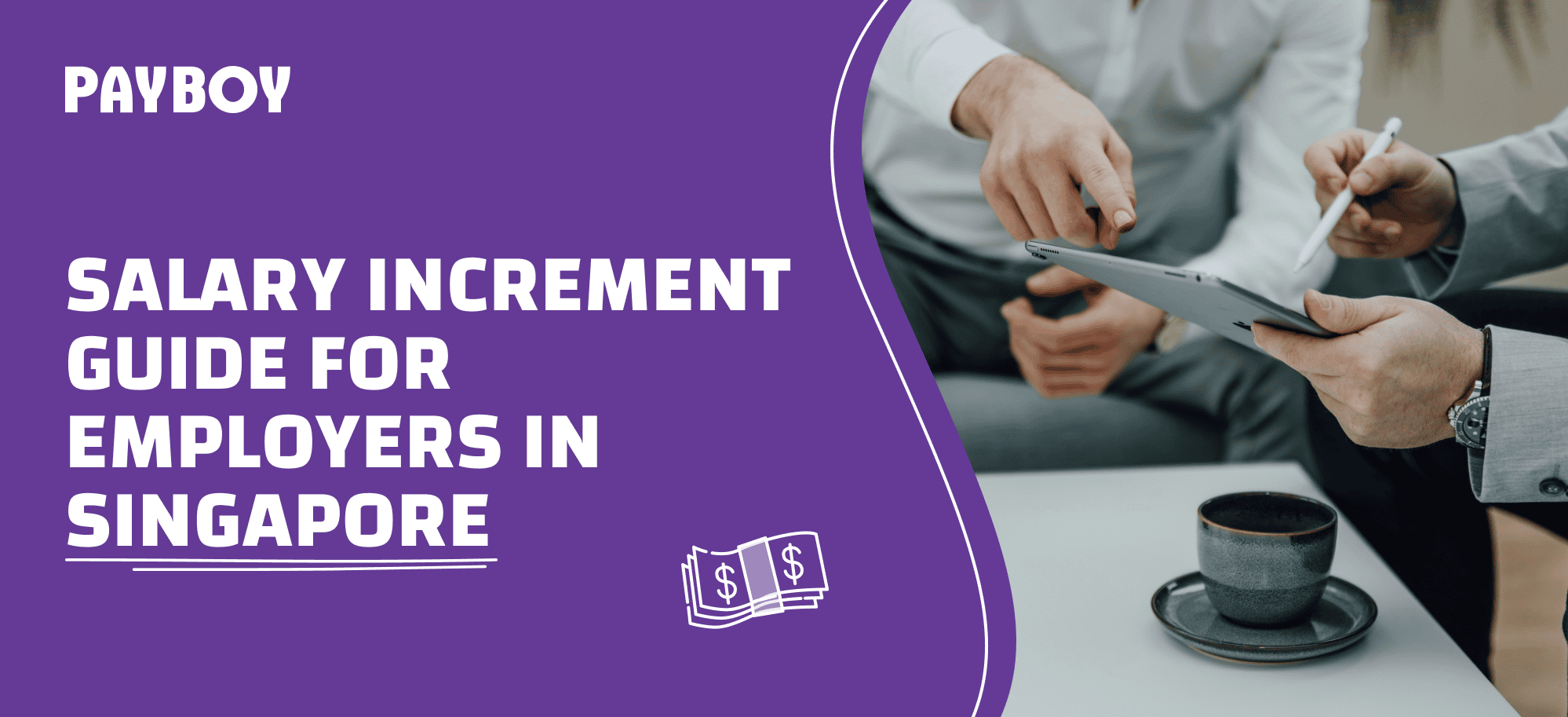In the dynamic and competitive business environment of Singapore, providing salary increments is a crucial component of maintaining a motivated and committed workforce. This guide aims to offer comprehensive insights for employers on how to effectively implement salary increments, ensuring that they align with both business goals and employee satisfaction.
What is salary increment?
A salary increment refers to an adjustment or raise in an employee’s salary. It is typically given in recognition of the employee’s performance, tenure, or in response to market conditions. The increment can be in the form of a percentage increase or a flat amount added to the current salary.
Types of salary Increments
- Merit-based increments: These are given based on individual performance. Employees who exceed their performance targets or demonstrate exceptional skills and competencies are rewarded with higher increments.
Are you planning to give a performance bonus instead? Read our bonus guide for employers in Singapore to find out more about how to say thanks to your employees for all their hard work.
- Standard increments: Often given to all employees, these increments are part of annual reviews and are meant to keep salaries in line with inflation or cost of living increases.
- Promotional increments: When an employee is promoted, their new role typically comes with increased responsibilities and a corresponding salary increment.
- Market adjustments: These increments are given to keep salaries competitive with market rates. Employers may periodically review industry standards and adjust salaries accordingly.
5 key considerations for salary increments
When planning for salary increments, it's essential to consider multiple factors that influence both the business and its employees. These key considerations will help ensure that salary adjustments are fair, sustainable, and aligned with your organisation’s strategic goals.
- Performance evaluation
Performance evaluations are the backbone of merit-based increments. Implement a robust performance management system that includes regular reviews, feedback mechanisms, and clear performance metrics. This ensures that salary increments are based on objective assessments of an employee’s contribution.
Refer to our guide for comprehensive tips on designing an effective performance appraisal system.
- Market research
Conduct regular market research to understand the current salary trends in your industry. This can be done through salary surveys, benchmarking studies, and utilising resources like the Ministry of Manpower’s (MOM) salary data. Staying informed about market rates helps in making informed decisions about salary adjustments.
- Budget constraints
While it’s important to offer competitive salaries, it must also be balanced with the company’s financial health. Develop a budget for salary increments and ensure that it aligns with the organisation’s financial capabilities. Prioritise increments based on critical roles, performance, and market competitiveness.
- Transparent communication
Transparency in how salary increments are determined and communicated is vital. Employees should understand the criteria for receiving increments. Clearly communicate the process, timeline, and factors considered for salary adjustments. This builds trust and reduces potential dissatisfaction.
- Legal compliance
Ensure that all salary increments comply with Singapore’s employment laws. Familiarise yourself with the Employment Act, which outlines the legal requirements for salary adjustments and payments. Adhering to these regulations prevents legal issues and promotes fair labour practices.
Singapore’s 2024 projections of salary increment
Singapore's dynamic economic landscape presents both opportunities and challenges for employers managing salary increments. With projections for 2024 indicating a cautiously optimistic outlook, it's crucial for employers to balance market demands with strategic financial planning.
Economic outlook for 2024
Singapore's economic growth is forecast to be between 1% and 3% in 2024. This optimistic outlook is underpinned by a strong recovery in sectors such as electronics, food and beverage (F&B), and travel-related industries. The electronics sector is benefiting from global and domestic demand for semiconductors, while the F&B and travel sectors are experiencing a rebound due to increased consumer spending and tourism. However, the Minister of Trade has cautioned about ongoing geopolitical uncertainties and global economic risks that necessitate a cautious approach
Projected salary increments
Workers in Singapore can expect an average salary increment of around 4% in 2024, with a median increase of 4.2%, according to Mercer’s Total Remuneration Survey. This projected nominal wage growth is driven by several factors:
- Rising demand for skilled professionals: The demand for skilled talent in various sectors continues to rise. This increased demand puts upward pressure on salaries as companies compete for top talent.
- Competitive job markets: With a tight labour market, employers are compelled to offer more competitive salaries to attract and retain employees. This is particularly evident in high-demand fields where specialised skills are crucial.
- Inflationary pressures: Inflation remains a significant factor influencing wage growth. Employers need to adjust salaries to maintain the purchasing power of their employees, ensuring that wage increments keep pace with the cost of living.
The combination of these factors suggests that while salary increments are expected, they must be managed carefully to align with broader economic conditions and organisational budgets
7 quick tips to design a salary increment policy
Designing an effective salary increment policy requires careful planning and a clear understanding of your organisation's goals and the broader market environment. These 7 quick tips will guide you in creating a robust policy that meets your business needs and supports employee satisfaction and retention.
Tip #1: Define your objectives
Before implementing a salary increment policy, clearly define the objectives. What do you aim to achieve? Whether it’s improving employee retention, boosting productivity, or staying competitive in the market, having clear goals will guide your policy development.
Tip #2: Establish clear criteria
Develop clear criteria for salary increments. This could include performance metrics, tenure, skill acquisition, and market conditions. Having well-defined criteria ensures fairness and consistency in the increment process.
Tip #3: Aligning salary increments with market trends
Regularly gather data on salary trends within your industry. Use resources like the MyCareersFuture.gov.sg salary guide and other industry reports. This will help you understand the market benchmarks and make informed decisions about salary adjustments.
Tip #4: Develop a budget
Create a budget for salary increments. Consider the company’s financial health, projected revenue, and other financial commitments. Allocating a specific budget helps in managing expectations and ensuring that increments are financially sustainable.
Tip #5: Communicate the policy
Communicate the salary increment policy to all employees. Ensure they understand the criteria, process, and timeline for increments. Transparency in communication helps in managing expectations and building trust within the organisation.
Tip #6: Conduct performance reviews
Implement regular performance reviews to assess employee performance. Use these reviews as the basis for merit-based increments. Ensure that the review process is objective, consistent, and transparent.
Tip #7: Review and adjust
Periodically review the salary increment policy to ensure it remains relevant and effective. Make adjustments based on employee feedback, market changes, and organisational goals. Continuous improvement helps in maintaining a fair and competitive salary structure.
Salary increment letter template
[Employer Name]
[Employer Position]
[Company Name]
[Company Address]
[City, State, ZIP Code]
[Email Address]
[Date]
[Employee Name]
[Employee Position]
[Department Name]
[Company Name]
Dear [Employee Name],
Subject: Salary Increment Notification
I am pleased to inform you that, in recognition of your exceptional performance and valuable contributions to [Company Name], we have decided to grant you a salary increment effective from [effective date].
Over the past [duration, e.g., year], your dedication, hard work, and commitment have significantly contributed to the success of our team and the company as a whole. Your performance in [mention specific achievements, projects, or contributions] has been exemplary, and we greatly appreciate your efforts.
Details of the Salary Increment:
- Current Salary: [Current Salary]
- New Salary: [New Salary]
- Percentage Increase: [Percentage Increase]
- Effective Date: [Effective Date]
We believe this adjustment reflects the value you bring to our company and aligns with our commitment to rewarding excellence. Your new salary will be reflected in your [next/next month’s] payroll.
We are confident that you will continue to excel in your role and contribute significantly to our shared goals. If you have any questions regarding this increment or any other matter, please feel free to reach out to [HR contact or manager’s name] at [contact details].
Once again, thank you for your hard work and dedication. We look forward to your continued success and contributions to [Company Name].
Sincerely,
[Your Signature]
[Your Name]
[Your Position]
Handle salary increments easily with Payboy HR and Payroll Software!
In managing salary increments, it's crucial for employers to ensure accuracy and compliance with regulations. Payboy HR and Payroll software simplifies this process! Here’s how you can use Payboy to manage your salary adjustments, such as increments, effectively.
With our fully compliant, customisable, and integrated payroll processing module, you can calculate payroll with ease with additional features that are designed to save you time and effort.
- 100% compliance and 100% peace of mind
- Forget about payroll and SDL calculations, CPF contributions, and IR8A submissions. Our software will automatically calculate them for you and keep you compliant with the latest regulations from MOM, CPF, and IRAS.
- Covers any work arrangement
- Transparent, Accurate, and Simple
- Have full visibility on how payroll is calculated automatically based on shifts, attendance, leave, and submitted claims within an intuitive experience.
- Customisable itemised payslips
- Fully integrated with your preferred platforms
- We’ll fit into your ecosystem seamlessly and keep your finance team happy. Learn more about our seamless integrations with Xero, Financio, and Quickbooks.
Streamline your HR processes with Payboy today!
As a PSG-approved HRMS, Payboy provides a robust system to help you manage your HR tasks so that you can focus on your business and people!
With our wide range of modules, you can customise a solution to meet the specific needs of your business:
Payroll Processing | Leave Management | Claims Management | Applicant Tracking
Time Attendance | Shift Scheduling | Appraisal System | Inventory ManagementProject Costing | Training Management






















